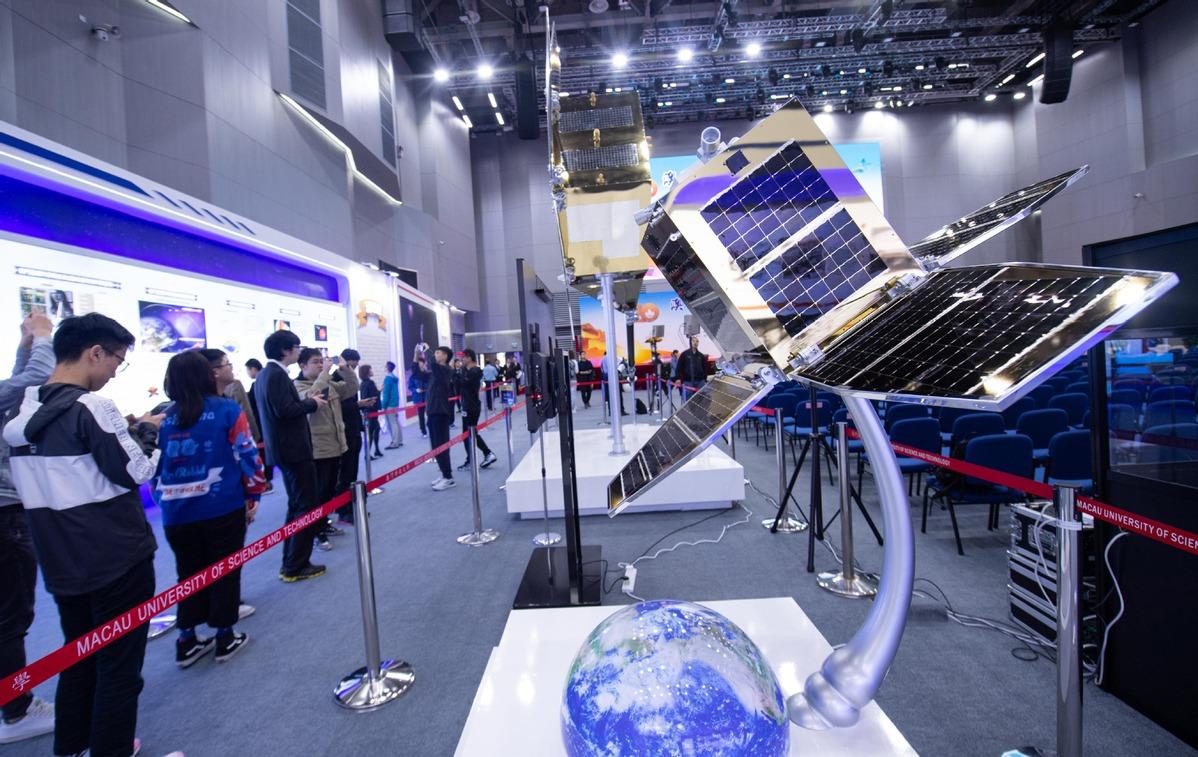 A model of the space exploration satellite Macao Science 1 is on display at an exhibition in Macau University of Science and Technology, on Dec 15, 2019. (PHOTO / XINHUA)
A model of the space exploration satellite Macao Science 1 is on display at an exhibition in Macau University of Science and Technology, on Dec 15, 2019. (PHOTO / XINHUA)
The Chinese mainland and Macao’s collaborative efforts in developing a cluster of satellites will pave the way for the creation of the first self-developed high precision magnetic field model of the Earth, which will consolidate the nation’s leadership in the aerospace field.
Zhang Keke, a renowned astrophysicist and chair professor at the Macau University of Science and Technology (MUST), made his remarks in an exclusive interview with China Daily on the sideline of the Boao Forum for Asia Annual Conference 2024 on Wendesday.
During the interview, Zhang also revealed that his university will establish an institute in Zhuhai, which is scheduled to be put into service in May, to facilitate the application of Macao’s aerospace research outcomes in Zhuhai by maximizing the strengths of the two cities.
Zhang Keke, a renowned astrophysicist and chair professor at the Macau University of Science and Technology, and his colleagues are teaming up with the China National Space Administration to develop the Macau Science satellites, a network of four satellites providing high-precision measurements of the Earth’s magnetic field
Zhang and his colleagues are teaming up with the China National Space Administration to develop the Macau Science satellites, a network of four satellites providing high-precision measurements of the Earth’s magnetic field.
Zhang said that the Earth’s magnetic field is one of the most basic studies of Earth science and directly relevant to human daily life. Also, it is a crucial infrastructure for a country and offers extensive potential applications in aspects such as civil aviation, navigation, mobile technology, and national defense.
Currently, there is no organization capable of providing high-precision measurements of the Earth’s magnetic field within China, making it a bottleneck technology, Zhang said, adding that the Macau Science satellites will greatly enhance the country’s accuracy and precision in studying the Earth’s magnetic field.
Earlier, Zhang’s team achieved a breakthrough with the development of Macau Science 1, the world’s first low-latitude, high-precision Earth measurement satellite constellation – 2 satellites working together for the same or similar purposes. Macau Science 1 launched from the Jiuquan Satellite Launch Center in northwest China on May 21, 2023, and started operations in November.
Zhang said the on-orbit constellation has achieved stable level of operation and is generating a substantial amount of high-quality data. This data will come to the application stage in the upcoming one to two years.
Currently, Zhang’s team is engaged in the development of Macau Science 2, which will also consist of two satellites.
Macau Science 2, which is expected to be launched in 2026, will have a distinct orbital angle compared to Macau Science 1, with a perigee of approximately 180 kilometers and an apogee of about 2,000 kilometers, Zhang said.
The two satellites’ constellation will work in coordination with one another, dedicating their operation to the exploration, measurement, and research of the Earth’s magnetic field, Zhang said.
With the help of the Macau Science satellites and advancements in relevant algorithms and software technologies, China is highly likely to construct its first comprehensive and high-precision model of the Earth’s magnetic field within the next two to three years.
This endeavor will help the country end its dependence on similar products from Europe and the United States, establishing self-sufficiency in this critical area, Zhang said.
“More than 2,000 years ago, the Chinese made a groundbreaking invention with the Si Nan, establishing ourselves as pioneers in the study of the Earth’s magnetic field. Now, with the advent of Macau Science, the nation is poised to reclaim its position as a world leader and center in this field,” Zhang said.
In October 2023, the Royal Astronomical Society, a well-known UK astronomy organization, organized a special international symposium dedicated to Macau Science 1. This was the first time a major Western research group had organized such an event specifically for a Chinese satellite.
There are already 18 top international research institutes that have expressed an interest in utilizing the data gathered by Macau Science 1, which solidifies China’s position as an important provider of international space data, Zhang said.
Enhancing cooperation
To better complete this project, it is crucial to strengthen cooperation between Macao and the mainland and leverage the respective advantages of the two places, Zhang said.
Under the “one country, two systems” principle, Macao enjoys a higher degree of policy freedom. Geographically speaking, it also has the distinctive advantages of enjoying proximity to the mainland and being closely connected to the world, making the city an ideal bridge to unite domestic and foreign research teams and foster international cooperation.
Meanwhile, the mainland possesses abundant land resources and holds a competitive edge in practical applications.
Working together with the city of Zhuhai, the Macau University of Science and Technology will establish an institute in Zhuhai on May 23, enabling the research results from Macao to be applied on the mainland. This initiative will synergize the expertise of Macao and the mainland, fostering integration between academia, industry, and research, Zhang said.
Zhang said that the date, May 23, was chosen to mark the first anniversary of President Xi Jinping’s letter to the MUST staff and students.
After the launch of Macau Science 1 on May 21, 2023, 18 students and teachers from the university who played a role in the satellite’s development wrote a letter to Xi to report on their progress and convey their strong determination to contribute to the motherland. Two days later, Xi responded to them with a letter of praise and encouragement.
“We hope to take this opportunity to celebrate and commemorate the special day,” Zhang said.


